Picture a hospital as a living, breathing organism. Its doctors, nurses, and personnel are its essential organs, pumping tirelessly to make it function. What about the nervous system, though, the system that interconnects all the parts, processes information, and makes it all run smoothly? That’s where custom healthcare software development fills the gap.
Just like a properly functioning nervous system, healthcare custom software development integrates various components of a medical facility, making operations smoother, providing accurate data flow, and improving patient care. But here’s the catch, most healthcare providers are still using old, inflexible software that makes them conform to technology instead of technology conforming to them.
For example, a hospital grappling with an off-the-shelf Electronic Health Record (EHR) solution. Physicians squander valuable time working through clumsy interfaces, which results in inefficiencies, miscommunication, and disgruntled staff. This is where EHR Development tailored to the hospital’s workflows can significantly improve usability and data accuracy. Alternatively, think about a telemedicine provider relying on a generic video conferencing platform that is lacking in key security features, which exposes sensitive patient information to jeopardy. In both scenarios, custom healthcare software development solutions can bring about a change of worlds.
If you are a manager, founder, or IT specialist pondering custom healthcare software application development, this guide is for you. We will discuss how healthcare software development is a game-changer, dissect the development process, and identify real-world examples. We will assist you in selecting the ideal healthcare software development company to turn your idea into reality.
How is AI in Healthcare changing the face of Healthcare Software?
Let’s dive in and explore how technology can become the heartbeat of modern healthcare.
What is Custom Healthcare Software Development?
It is the process of designing, developing, and deploying healthcare software that addresses the unique requirements of healthcare providers, hospitals, and medical organizations. In contrast to off-the-shelf solutions, which provide a one-size-fits-all solution, custom software development services are crafted to integrate perfectly with current workflows, enhance efficiency, and promote better patient care.
Examples of healthcare custom software include:
- Electronic Health Records (EHR) and Electronic Medical Records (EMR) systems
- Telemedicine platforms
- Patient management systems
- Hospital management solutions
- Medical billing and revenue cycle management software
- AI-powered diagnostic and decision-support tools
Why not just use Off-the-Shelf Software instead of Custom Healthcare Software Development?
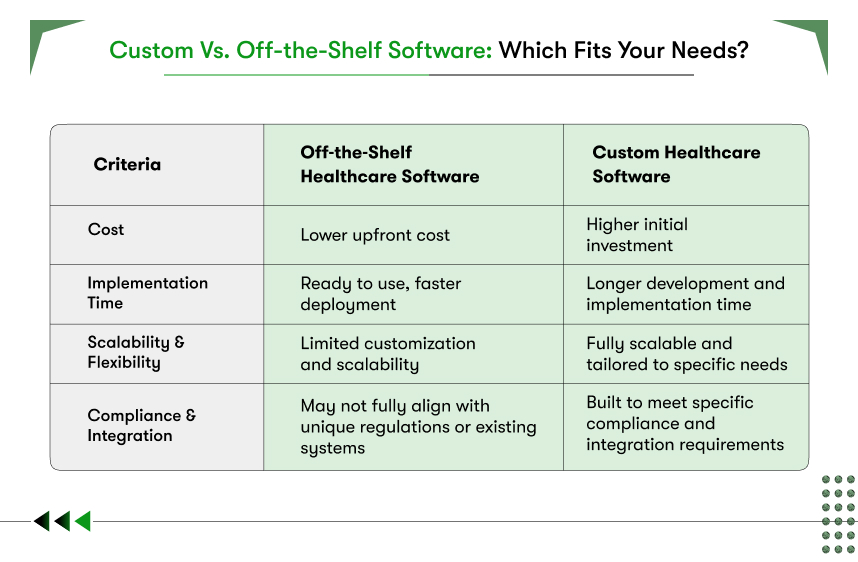
Off-the-shelf software can look like an easy solution, but it usually has its limitations:
- Lack of Flexibility: Generic software requires healthcare organizations to adapt their workflows rather than the software conforming to their requirements.
- Security Threats: Pre-installed solutions do not necessarily possess strong security capabilities and therefore are susceptible to cyber-attacks.
- Integration Issues: Most off-the-shelf products do not integrate well with hospital systems.
- Hidden Costs: Commercial software may be more costly in the long term due to licensing fees and constant updates.
On the other hand, custom development for healthcare provides solutions that are:
- Customized to the unique demands of your hospital or medical practice.
- Scalable, with room for future growth and feature enhancement.
- Safe, with compliance provisions in mind (HIPAA, GDPR, etc.).
- Effective, streamlining operations and minimizing bureaucratic burdens.
What is the step-by-step process Custom Healthcare Software Development?
Each healthcare organization poses its own set of challenges, whether it’s handling patient information, optimizing operations, or meeting compliance with stringent regulations. Off-the-shelf software tends to lack the specifics needed to handle these particular requirements, so custom healthcare software development is a wiser alternative.
But how do you transform an idea into a fully functional healthcare solution? What are the steps in custom software development for healthcare? This guide outlines the whole process, from planning to deployment, and describes how custom software development services can build solutions that fit your requirements.
Let’s dive in:
Step 1: Understanding Requirements and Planning
Step 1 in custom software development process is requirements gathering and objective setting. This entails:
- Understanding the specific needs of the healthcare provider
- Finding pain areas and inefficiencies within existing processes
- Maintaining compliance with legal and regulatory guidelines
- Identifying key features and functionalities
It is at this point that collaboration among stakeholders, healthcare providers, software developers, and IT departments is critical to developing an in-depth project roadmap.
Step 2: Market Research and Feasibility Analysis
Before development begins, a thorough market analysis helps in:
- Identifying industry trends and best practices
- Assessing competitor solutions
- Understanding potential technical challenges
- Estimating costs and required resources
Feasibility studies ensure that the proposed custom healthcare software development solutions are viable, scalable, and cost-effective.
The custom software development market size is expected to see exponential growth in the next few years. It will grow to $120.22 billion in 2029 at a compound annual growth rate (CAGR) of 22.0%. (The Business Research Company)
Step 3: UI/UX Design and Prototyping
User interface (UI) and user experience (UX) play a significant role in the development of custom healthcare software applications. The system has to be accessible to the patients and medical personnel with ease.
This stage incorporates:
- Wireframing and prototyping
- Creating intuitive interfaces for various user roles
- Providing accessibility and responsiveness
Through interactive prototypes, stakeholders are able to give feedback prior to actual coding.
Step 4: Development and Implementation
The center of software development services is the process of actual coding. This includes:
- Selecting an appropriate tech stack (e.g., Java, Python, .NET, React, or Angular)
- Deploying key functionalities like data security, interoperability, and scalability
- Ensuring smooth integration with legacy systems such as EHRs, PACS, and other health care databases
Agile development methods facilitate developing incremental improvements with an assurance of flexibility and accommodation to user requirements.
Step 5: Testing and Quality Assurance (QA)
Healthcare software has to have high levels of accuracy, security, and reliability. The testing process involves:
- Unit testing and integration testing
- Performance testing for system stability under heavy loads
- Security testing to safeguard sensitive patient information
- User acceptance testing (UAT) to garner feedback from hospital staff
Careful testing helps ensure the software is in keeping with industry regulations and operates error-free.

Step 6: Deployment and Integration
Once the software has met all quality assurance, it’s deployable. This stage entails:
- Deploying the software in a live environment
- Facilitating smooth integration with current healthcare IT infrastructure
- Educating the healthcare professionals about using the system efficiently
There is a flawless deployment process to reduce downtime and achieve a proper transition.
Step 7: Post-Deployment Support and Maintenance
A trustworthy custom software development company provides continuous support to guarantee long-term success. This involves:
- System performance monitoring
- Fixing bugs and security issues
- Revision of the software according to changing healthcare regulations
- Incorporating new features according to user reviews
Regular maintenance keeps the software running effectively and up to date.
What are the Benefits of Custom Healthcare Software Development?
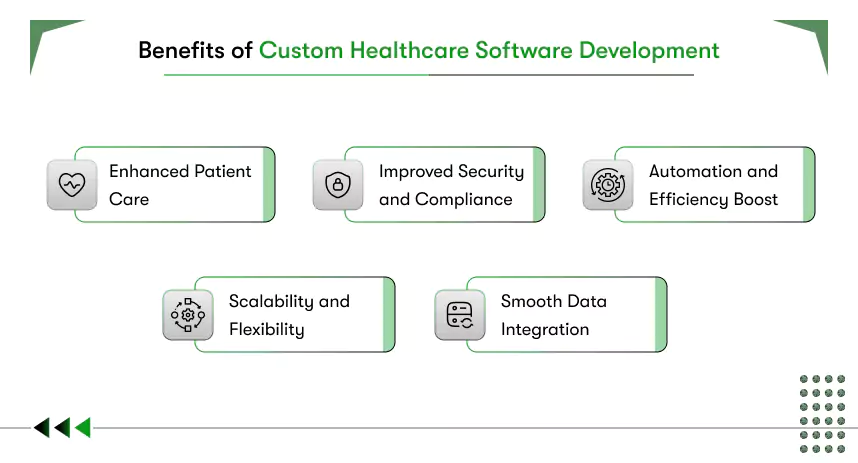
Custom Healthcare Software Application Development offers tailored solutions that fit the unique needs of healthcare institutes like improving efficiency, patient outcomes, and security. Additionally, healthcare software development is scalable and adaptable, evolving with the organization’s needs without the limitations of pre-built systems.
- Enhanced Patient Care: Custom solutions allow for improved patient care, real-time tracking, and improved communication between patients and physicians.
- Improved Security and Compliance: With health data being extremely sensitive, custom solutions comply with HIPAA, GDPR, and other regulatory requirements while putting in place stringent security protocols.
- Automation and Efficiency Boost: From appointment scheduling to billing automation, custom healthcare software eliminates the drudgery of manual tasks, minimizing errors and administrative burden.
- Scalability and Flexibility: In contrast to off-the-shelf products, software built to custom specifications can expand with the organization and evolve according to changing requirements.
- Smooth Integration: Custom solutions easily integrate with already existing EHRs, CRMs, and other healthcare software, providing for smooth data integration.
Do you know about these Healthcare Technology Trends?
What are the Types of Custom Healthcare Software Development Solutions?
Electronic Health Records (EHR) & Electronic Medical Records (EMR)
EHR and EMR systems computerize patient information, allowing physicians, nurses, and medical professionals to easily access and modify records. Custom healthcare software development services guarantee that these systems are integrated with other applications such as billing, scheduling, and lab reports.
Example: A hospital may require an EHR system that is integrated with its radiology department for immediate access to imaging reports.
Telemedicine Platforms
Telemedicine is now a staple of contemporary healthcare with telemedicine allowing physicians to remotely consult patients. Custom healthcare software application development guarantees that these systems are secure, intuitive, and privacy regulation compliant.
Example: A telehealth company requiring HIPAA-compliant video consultations, symptom analysis using artificial intelligence, and e-prescribing.
Hospital Management Systems (HMS)
Hospitals need advanced software for managing patient histories, scheduling, billing, and inventory. Healthcare custom software development offers automation and data analytics to enhance productivity.
Example: A multi-specialty hospital looking for a system that integrates emergency, outpatient, and in-patient departments real-time.
Patient Portals
A custom healthcare software development organization can build patient portals customized with features where the users have access to medical history, book appointments, and message healthcare providers.
Example: A clinic interested in providing an online patient dashboard that includes test results, reminders about appointments, and secure messaging.
AI-Powered Diagnostics and Decision Support Systems
AI-based software can aid doctors in disease diagnosis, medical image analysis, and treatment planning.
Example: An AI-based image analysis for early-stage melanoma in a dermatology clinic.
Wearable Device Integration
Smartwatches, fitness trackers, and medical devices produce useful health information. Custom healthcare software development can link wearable technology to hospital systems for real-time tracking.
Example: A cardiology clinic employing ECG wearables to monitor patients’ heart conditions remotely.
How much is the cost of a Custom Healthcare Software Development Services?
The cost of custom healthcare software development varies with several factors such as the complexity of the application, features needed, integration with current systems, adherence to healthcare regulations, and maintenance.
In contrast to off-the-shelf products, custom software is developed from scratch, which is an expensive process but provides long-term benefits by enhancing efficiency, minimizing administrative expenses, and improving patient care. Development costs can be moderate budgets for small-scale applications or heavy investment in enterprise-scale platforms with analytics driven by artificial intelligence, integration into the cloud, and cutting-edge security controls.
A broad outline of the cost components follows:
- Planning & Research ($5,000 – $20,000): Covers market analysis, requirement gathering, and regulatory compliance considerations.
- UI/UX Design ($10,000 – $50,000): Ensures intuitive and user-friendly interfaces for doctors, administrators, and patients.
- Development ($50,000 – $500,000+): The largest cost factor, influenced by the complexity of features, technology stack, and third-party integrations (e.g., EHRs, telemedicine, AI tools).
- Testing & Quality Assurance ($20,000 – $100,000): Includes functional, performance, and security testing to ensure compliance with HIPAA, GDPR, and other regulations.
- Deployment & Integration ($10,000 – $50,000): Covers system setup, cloud hosting, and seamless integration with existing healthcare infrastructure.
- Ongoing Maintenance & Support ($5,000 – $100,000 per year): Involves software updates, security patches, and feature enhancements to keep the system running smoothly.
For small healthcare implementations, prices range between $50,000 and $150,000, whereas large enterprise solutions range over $500,000. Although the cost of initial implementation is high, custom software development for healthcare pays for itself over time by eliminating inefficiencies, streamlining processes, and enhancing patient care as a whole.
Why Kody Technolab Is the Best Choice for Custom Healthcare Software Development
Custom healthcare software development involves choosing the right technology partner for creating secure, scalable, and efficient solutions. Kody Technolab is a leading Healthcare App Development Company specializing in providing advanced, compliant, and fully customized software solutions addressing the unique needs of healthcare providers. Having profound experience in custom healthcare software development services, Kody Technolab assists healthcare startups, hospitals, and clinics in streamlining their operations, improving patient care, and sustaining regulatory compliance.
Their team of seasoned developers, designers, and healthcare IT consultants delivers flawless custom healthcare software development, merging cutting-edge technologies like AI, blockchain, and IoT to develop future-ready solutions. From custom healthcare software application development for electronic health records (EHRs), telemedicine platforms, medical billing systems, to AI-driven diagnostic solutions, Kody Technolab focuses on innovation, security, and user experience. Their custom healthcare software development solutions are compliance-focused, adhering to HIPAA, GDPR, and HL7 standards to protect sensitive patient information.
Unlike off-the-shelf solutions, their healthcare custom software development methodology provides full flexibility, allowing them to integrate seamlessly with current healthcare IT systems using customized solutions for unique operational challenges. As a leading Healthcare IT Consulting Company, Kody Technolab offers end-to-end custom healthcare software development solutions, from requirement gathering and UI/UX design to development, testing, and post-launch support, all focused on increasing efficiency and enhancing healthcare outcomes.
Their commitment to quality, agile development methodologies, and client-focused approach make them the preferred choice for organizations looking to invest in custom software development for healthcare. By partnering with Kody Technolab, healthcare providers can build tailored solutions that enhance workflows, improve patient engagement, and achieve long-term digital transformation.

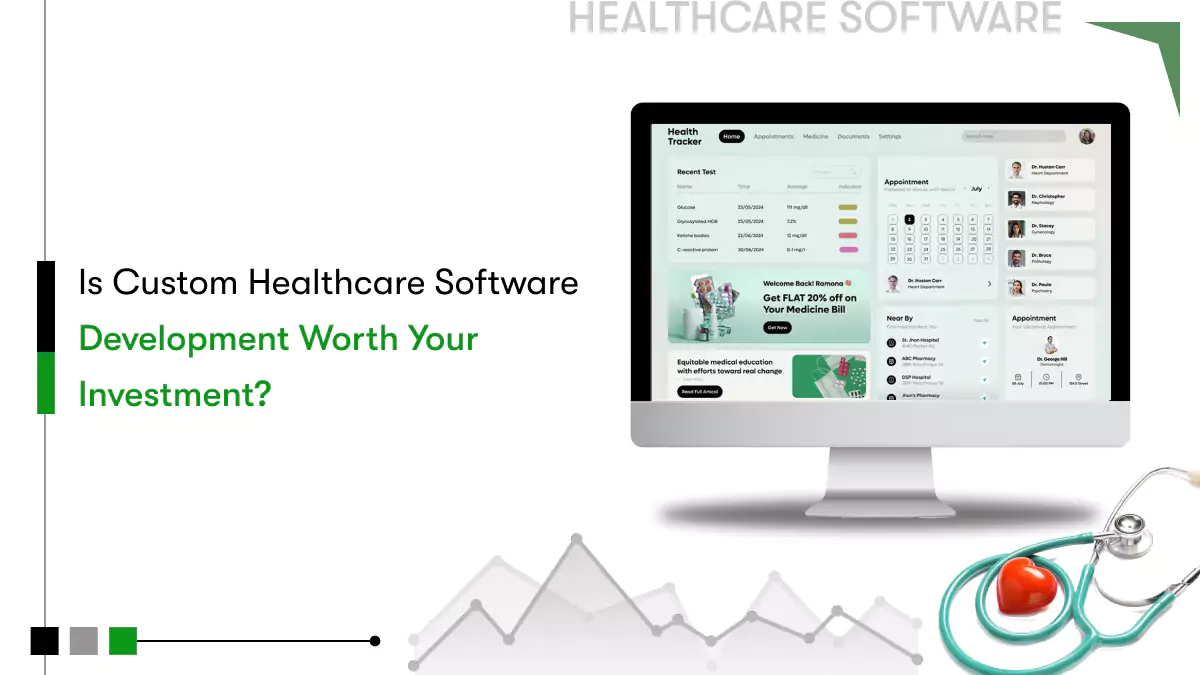
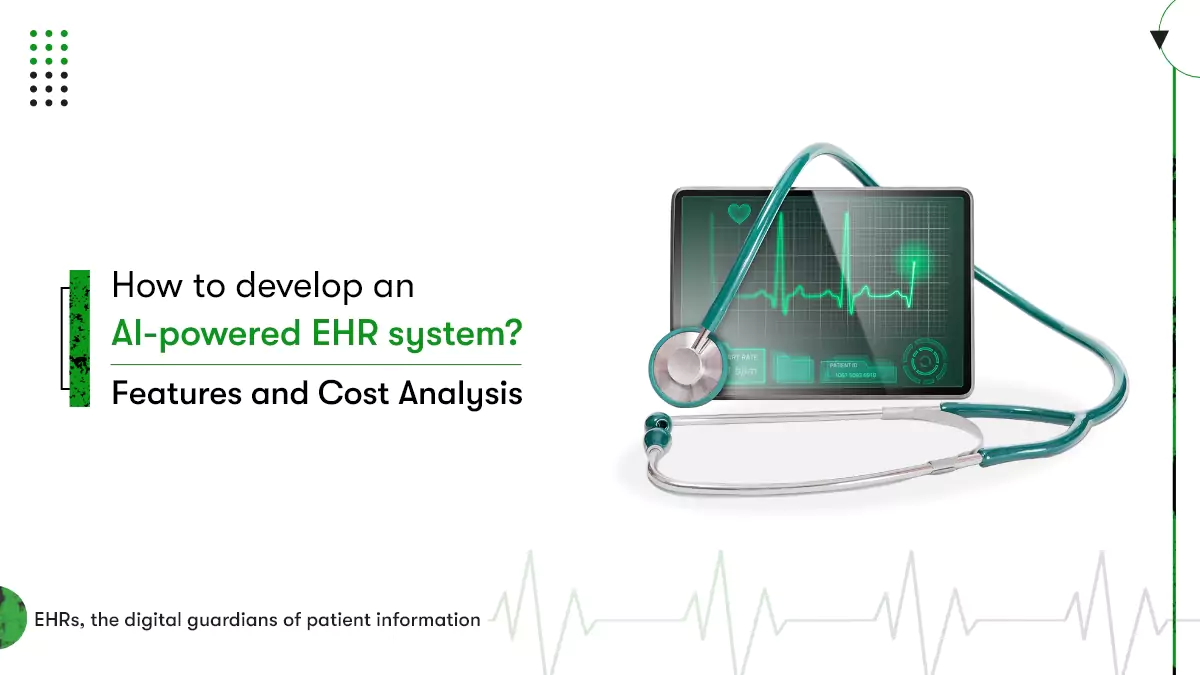
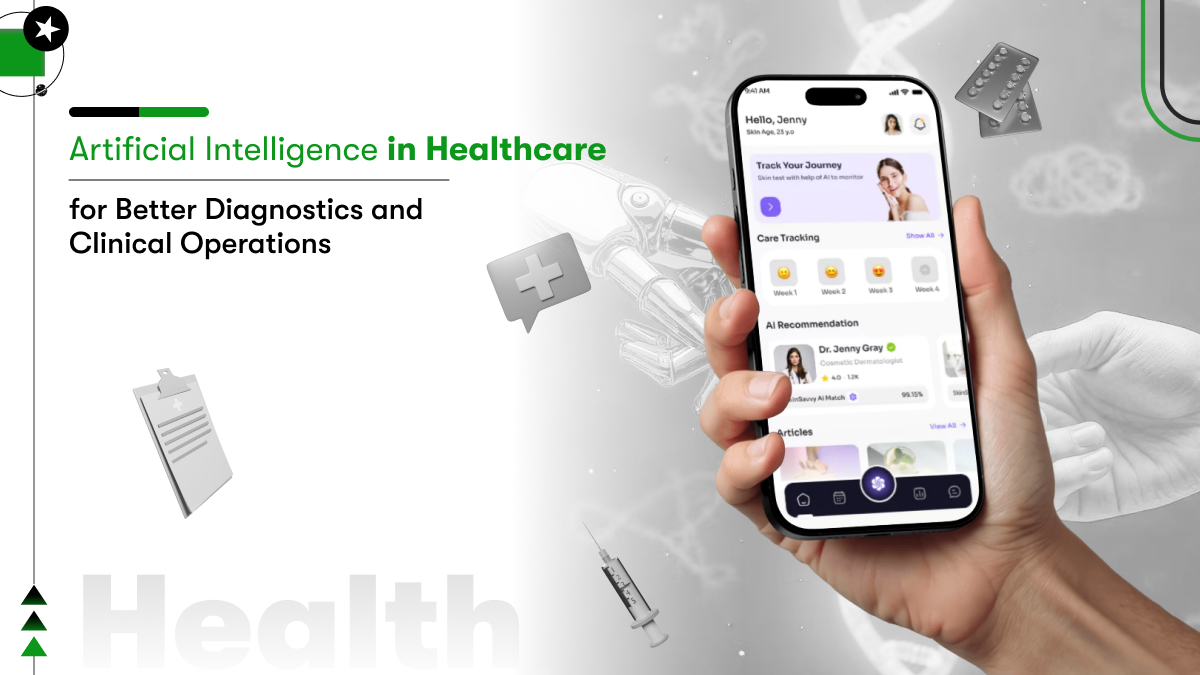
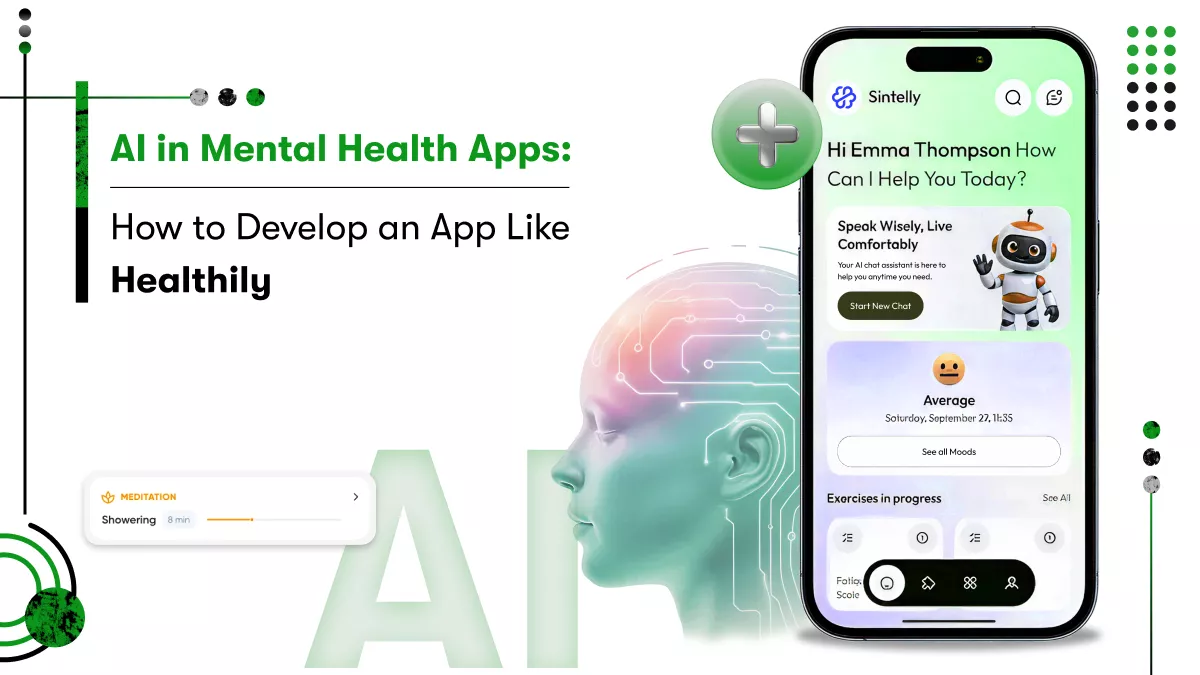
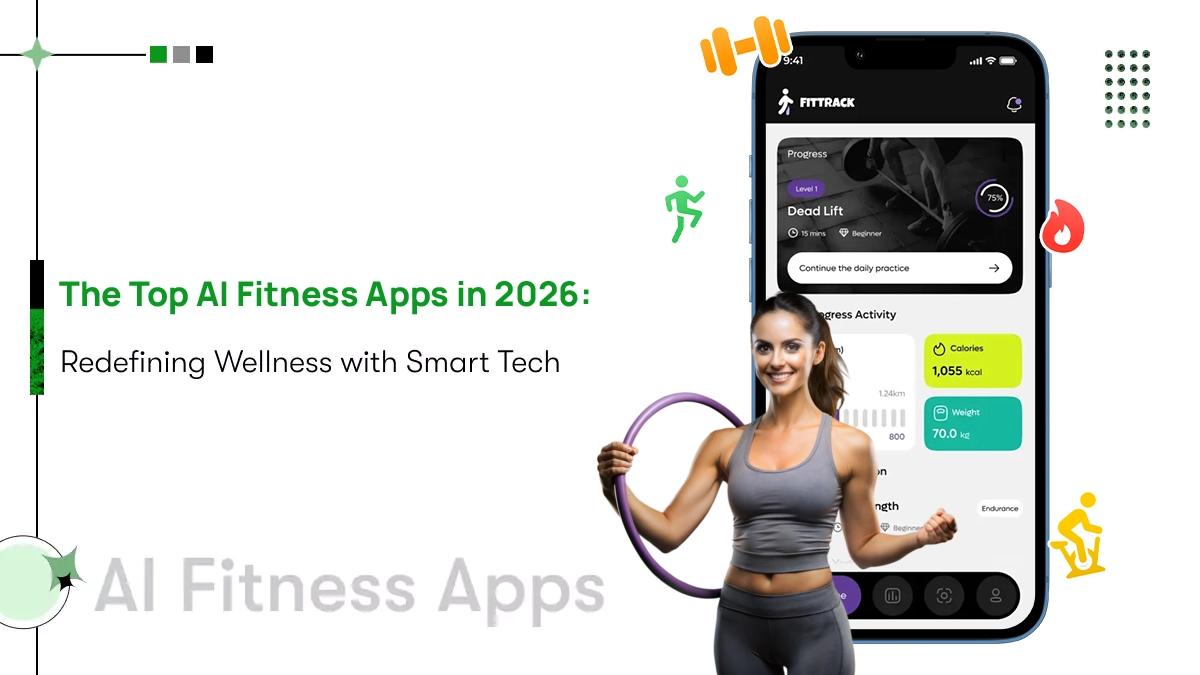






 Contact Information
Contact Information